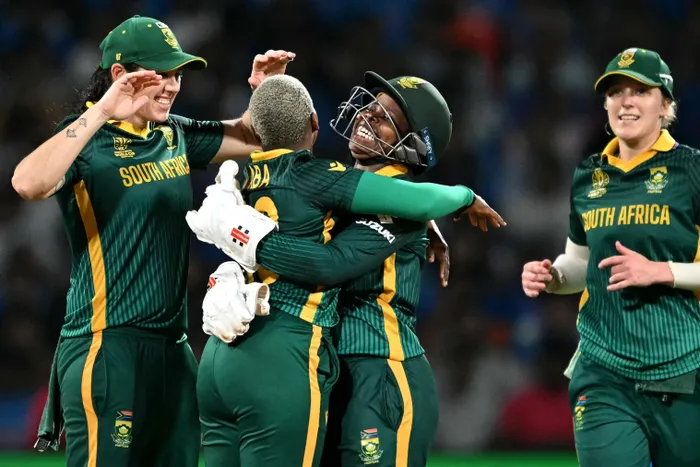Women’s sport: support, choice, and perspective
'Sport, for me, is entertainment'

South Africa's captain Laura Wolvaardt celebrates after scoring a century during the ICC Women’s World Cup final match between India Women and South Africa Women at DY Patil Stadium in Navi Mumbai on November 2
Image: IANS
I LISTENED eagerly to South African social media personality Thanja Vuur’s comments about the lack of support for the Proteas women’s team at last Sunday’s Cricket World Cup ODI final, and I thought I would share my thoughts. Firstly, I do think it might have been appropriate for the Minister of Sport, Gayton Mckenzie, to have attended.
To many cricket fans, the ODI World Cup is considered the authentic world championship, so he may have missed a trick. That said, I do not think it is mandatory for every sports minister from every nation to show up at every major event.
Imagine an Olympic Games packed with 150-odd ministers and their entourages – they would take up all the VIP seats! But enough about that. Now, to be honest, I only watch sports that I genuinely enjoy.
For instance, I no longer watch any Sharks games or PSL matches. I watch my team, Arsenal, every week and follow Liverpool and United results.
I love Bafana Bafana and think they have a bright future, but I do not catch every game. I watch most Springbok matches (except when they are playing minnows), and I follow the Proteas men’s side, though I do miss quite a few games because there’s just so much sport on.
I closely follow the Sinner - Alcaraz rivalry in tennis and try to catch the weekly PGA Tour, though I skip LIV entirely. These are simply personal choices. Honestly, I hardly watch any women’s sport - maybe some golf.
World number one, Atthaya Thitikul, from Thailand plays an incredible game, as does Nelly Korda.
But between that and golf lessons on YouTube, there is not much time for more. I do not even follow the top padel players, even though I play a lot myself and consider myself half decent. Does the fact that I do not watch all Bafana games, PSL fixtures, or the Sharks make me less patriotic? I do not think so.
Sport, for me, is entertainment.

outh Africa's Nonkululeko Mlaba celebrates with teammates after taking the wicket of India's captain Harmanpreet Kaur during the ICC Women's Cricket World Cup 2025 one-day international (ODI) final match between India and South Africa at the DY Patil Stadium in Navi Mumbai
Image: Punit Paranjpe / AFP
Just as I prefer biopics and historical dramas to action-heavy “skop, skiet en donder” movies, I choose what I enjoy watching. Many people make similar arguments about how South African advertising favours certain sports. The local ad industry has long ignored football stars in favour of rugby and cricket players. When last did you see a South African soccer player in a major ad campaign? It’s probably one football for every two hundred rugby or cricket ads. Now, back to women’s cricket. Like with Bafana, I do not watch every match. I did not watch every game of the early stages of this year’s Women’s World Cup, but I was glued to the semi-final and final.
I thought the team played brilliantly. And they were also great in the T20 final last year, which I watched and supported eagerly. Will I keep watching them? Definitely. Will I watch every game? Probably not.
Will I watch every Yannik Sinner match? Absolutely. As for why the Indian men’s players attended the women’s final in Mumbai while the South African men didn’t – it is quite simple: geography.
It was in India, so it was close to home. If the final had been at the Wanderers, I am sure the Proteas men would have shown up in full force. And let us not forget: how many Indian male cricketers flew to Australia in 2005 or to England in 2017 to support their women’s team in the World Cup finals? Apart from broadcasters and officials, I doubt there were many. So it’s not necessarily about patriotism - it’s about convenience, cost, and popularity. To conclude women's sport has long battled for equality - not only in pay and opportunity but also in visibility and cultural respect.
Tennis legend Martina Navratilova has often spoken about this imbalance, noting that while women train and compete with the same dedication as men, they receive far less media coverage and financial reward.
She argued that equity was not about giving women “extra,” but about giving them “fair” - ensuring that their performances are valued on their own merits rather than constantly compared to men’s. On the other hand, John McEnroe has famously said that men’s sport attracted more viewers simply because it was “more popular.”
While that might reflect a commercial reality, it also exposes the circular trap women’s sport faces: without exposure and investment, it can’t build a big audience - and without a big audience, it is denied exposure and investment. Popularity, then, is not inherent; it is created through media attention and cultural focus.
Women’s sport deserves both.

Robbie Naidoo
Image: Supplied
Naidoo is an author and a sportswriter for 30 years. He played representative tennis, squash and cricket and has reported both locally and internationally and covered four Olympic Games.